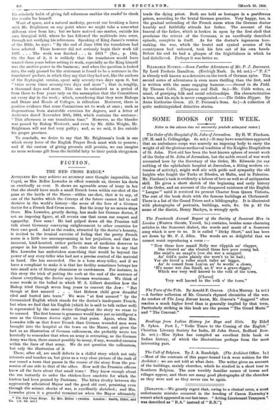FICTION.
THE RED CROSS BARGE.•
ARTILLERY fire may achieve an accuracy once thought impossible, but Cupid, as Mrs. Belloc Lowndes in effect reminds us, throws his darts as erratically as ever. It shows an agreeable sense of irony in her that she should have made a small French town within ear-shot of the guns at the battle of the Marne—within ear-shot, that is to say, of one of the battles which the Creasys of the future cannot fail to call decisive in the world's history—the scene of the love of a German doctor for a French Red Cross nurse. But the irony by no means stops there. Mrs. Lowndes, greatly daring, has made her German doctor, if not an imposing figure, at all events one that earns our respect and sympathy. Poor man ! He had gulped down all the Prussian tall talk about Germany conveying enlightenment to other countries for their own good. And so the reader, attracted by the doctor's honesty, is invited to the ironical exercise of feeling that the pretty French nurse is a little too uncompromising in her prejudices, and that the innocent, kind-hearted, rather pathetic man of medicine deserves to prosper in his honourable suit. To state the theme is to say that Mrs. Lowndes has undertaken something that would be beyond the power of any story-teller who had not a precise control of the material in hand. She has succeeded. She is a born story-teller, and if we have a complaint to make it is that her facility sometimes betrays her into small acts of literary clumsiness or carelessness. For instance, in this story the trick of putting the verb at the end of the sentence of almost everything the doctor says becomes wearisome. We think of some words in the ballad in which W. S. Gilbert describes how the Bishop tried through seven long years to convert the Jew : " But though at first amused . . . that Hebrew child grew dreadful riled and busted into tears." We were "at first amused " by the Germanized English which stands for the doctor's inadequate French, but when we find that his English (which he is said to talk rather well) is represented by the same device throughout the story we cease to be amused. The first lessons in grammar would have put so intelligent a man as the German doctor right on that point. Again, when Mrs. Lowndes tells us that fewer French than German wounded men were brought into the hospital at the town on the Marne, and gives the fact as an illustration of German callousness, she probably wrote too hurriedly to remember that when an army is retreating, as the German Army was then, there cannot possibly be many, if any, wounded enemies within the lines of that army. We do not question the callousness, but only the illustration of it.
These, after all, are small defects in a skilful story which not only interests and touches us, but gives us a very close picture of the rush of war round a town that passes in the course of the story from the pos- session of one side to that of the other. How well the Prussian officers knew all the facts about that small town ! They knew enough about the inn instantly to order the chicken-liver omelette for which the hostess had been praised by Parisians. The bitter rivalry between the aggressively atheistical Mayor and the good old cure, persisting even through the seismic shocks of war, is excellently sketched ; and Mrs. Lowndes gives it a graceful termination .when the Mayor ultimately
^• The Red Cross Ram. By Mrs. Belloo 1 ?wades. London ; Smith, Elder, and Co. Os. ed. net.)
tends the dying priest. Both are held as hostages in a pestiferous prison, according to the brutal German practice. Very happy, too, is the gradual unbending of the French nurse when the German doctor humbly and faithfully attends her father. The account of the funeral of the father, which is broken in upon by the first shell that proclaims the retreat of the Germans, is an excellently described episode, complete in itself. As for the doctor's ingenuous love- making, the war, which the brutal and cynical avarice of his countrymen had unloosed, took his fate out of his own hands Before his end he had a glimpse of the frightfulness in which he had disbelieved. Perhaps it was better so.


























 Previous page
Previous page